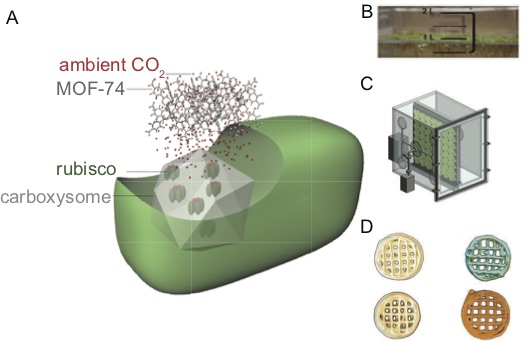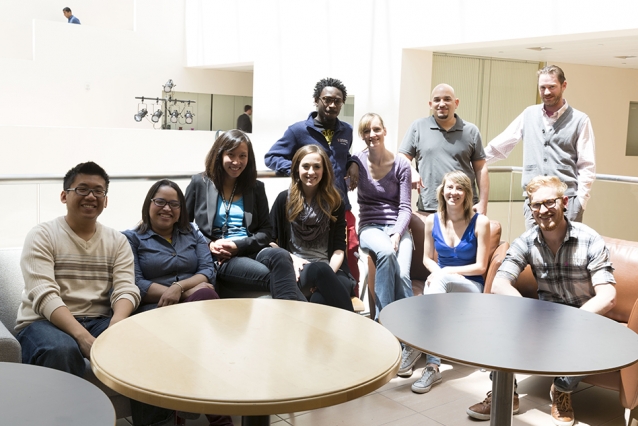Broader Impacts in the Brozek Lab
Researchers in the Brozek Lab are encouraged to think as citizen scientists. Beginning at the inception of a research project and extending throughout the course of a PhD career, we remind students to question the relevance of their work to the most general audiences and toward achieving a more sustainable society. We carry this ethos beyond the laboratory and into our immediate academic and civic communities. Please read below for details on our efforts to build cross-disciplinary and cross-industry partnerships to extend the broader impacts of our research.
We strive to foster healthy, respectful, and productive research environments in the Brozek lab and at UO, and prioritize mentoring early-stage scientists from diverse backgrounds. Therefore, Carl and the Brozek lab have spearheaded several educational initiatives aimed at engaging underrepresented minority students and maintaining high standards of inclusiveness and social sensitivity. Please read below for details on "ChemREFS", "Best Practices in Academic Advising", "Skill-Training Workshops for Undergrads", and "Rehearsals for Life".
Cross-Sector Outreach on Gas Capture and Separation Technology
Fostering collaborations between industrial and academic researchers benefits students through access to analytical techniques beyond in-house research capabilities, with direct and immediate impacts on technology, insight into conducting research responsive to real-world market demands, and the opportunity to be trained for future employment. Industry, on the other hand, benefits from investigations of highrisk ideas, with shortened development cycles. The Brozek lab facilitates cross-industry knowledge transfer through a variety of mechanisms, including student visits to industrial partners to promote integrating basic research and innovation,fostering industry-university research partnerships, learn the theory and practice of analytical techniques available to industry, promote industry ties.
Implementing advanced functional materials into prototype building technologies requires collaborative research efforts, presenting unique opportunities for interdisciplinary graduate student training. To evaluate the utility of MOF particles prepared in the Brozek lab for gas separation and capture, Carl has joined a preliminary project with Prof. Van Den Wymelenberg in UO Architecture to design “green wall” materials that synergistically employ MOFs to concentrate CO2 for photosynthetic conversion by azolla, a robust plant material. ith Prof. Van Den Wymelenberg, the Carl is creating a program to pair chemistry students from the Brozek lab funded with architecture students at UO. Architecture students learn basics of materials chemistry and gas sorption technology, and design prototype MOF-azolla hybrid “green walls” for use as active air-purifiers, while chemistry students train in 3D-printing building materials to host MOF-azolla hybrids and fundamentals of “green wall” design. All students participate in the industrial knowledge-transfer program described above.

MOF-Azolla composite designs spearheaded by UO architecture student Hooman Parhizkar.
Broader Impacts Graduate Training
Implementing broader impacts activities provides an opportunity for PhD students to gain leadership, communication, and professional development experience. To train cohorts of students in translating these research aims into outreach relevant to industry and society, Carl, Prof. Boettcher, and other colleagues, have spearheaded a training program for PhD students to provide incentives for PhD students to design impactful and sustainable broader impact activities that benefit society. The core aspects of this program are: (1) Discuss with students literature on the benefits and strategies for implementing broader impacts activities (2) Assigning students mentors to guide and execute the activity (3) Students compose a 1-2 page proposal describing the proposal and how it will be assessed (4) Implementation and assessment of the activity (5) Dissemination of the details and outcomes of the activity via a public UO chemistry "chemimpacts" website.
Research Skill Training Workshops for Undergrads
Achieving successful careers in science requires diverse skillsets often learned outside formal classroom settings. The Brozek Lab leads a targeted program to improve access to professional and research skills to improve the placement and retention of students in all stages of science careers, whether in graduate programs, industrial positions, or in science communication, legal, or policy firms. We target skills ranging from software for data analysis, visualization, and field-specific tasks; communication, including written, visual, and oral; and career preparation, including resumé building and assistance with job and graduate-school applications and interview preparation. Although successful programs exist for undergraduate research immersion, they emphasize laboratory research, rather than the soft and professional skills required to be successful in their current research as well as their future career. We are creating a recurring training workshop series for undergraduate researchers that focuses on teaching software, communication, data analysis, and career preparation tools. This workshop comprises general skills applicable to students from wide-ranging science disciplines and specialized field-specific skills. The training resources offers a combination of hybrid-in-person / virtual-synchronous workshops, pre-recorded video content, and hardcopy written tutorials. All materials will be freely distributed online to maximize impact. A preliminary resource is available HERE for tutorials on the "core curriculum" of the workshop series.
Workshops on Practicing Sensitivity to Diversity
Safe and productive research environments demand the utmost sensitivity to the diversity of com-munity members. In collaboration with UO graduate students, Carl works with “A Community for Minorities in STEM” (CMiS) and LGBT+ in STEM to spearhead workshop series for faculty and graduate students geared towards building healthier relationships. Each installment offers safe and professional settings to train members of the UO community in best practices for advisee-advisor communication. They address specific challenges to the advising relationship, such as misconceptions about background and race, and promote awareness to communication practices that are more sensitive to our diverse community. Carl and students collaborate with Rehearsals for Life (RFL), a theater troupe that uses interactive performances to address issues surrounding the dynamics of power and privilege. Workshop attendees practice navigating situations that often challenge the advising relationship. Goals include (1)maintaining a welcoming environment across the University of Oregon more sensitive to the challenges facing fellow community members (2) improving retention and recruitment of underrepresented students and (3) disseminating knowledge about resources available to minority students. Workshops will eventually be incorporated into yearly orientation training of new UO PhD students.
UO ChemREFS
A healthy and productive graduate mentoring program requires diverse, equitable, and inclusive work environments. Based on the Carl’s graduate experience with a similar program, he spear-headed the creation of UO ChemREFS (Resources for Easing Friction and Stress). The mission of the program is to improve the graduate student experience by serving as a confidential and low-barrier resource for chemistry graduate students. As a pilot study, Carl secured UO funds for the inaugural group of “REFS” who are trained in a 12-h workshop series led by UO professor of mediation law, John Inglish, on strategies for identifying and handling conflict. Check out this website to setup meetings between REFS and students seeking help, and find centralized information about student resources, including a decision-tree poster for students to help students identify resources. Through this program, Carl hope to improve retention of underrepresented groups by creating a more supportive mentoring environment by enhancing awareness of student backgrounds and addressing conflicts as they arise. To integrate this program into the department culture, REFS will hold workshops on active listening for all incoming PhD students annually.
Best Practices in Academic Advising
Advisors and advisees could use some guidance during the mentoring relationship. Defining best practices can be complicated, however, because so much depends on the institution, academic field, and the specific personalities of the faculty and students. Nevertheless, establishing a two-way street of expectations between the advisor and advisee is paramount for ensuring productive and healthy academic relationships. Expectations set for the mentoring experience should encompass what constitutes reasonable working hours, constructive feedback, graduation goals, career development, and other important areas. Communication is key to establishing these expectations early and often. Despite the individual nature of each realtionship, we aim to establish high standards of advising at the University of Oregon and at institutions across the country.
Our efforts to improve academic advising originates in Carl's Advising Initiative at MIT during his graduate school years. Working with administrators, faculty, and students from every department at MIT, and various student and faculty associations, he led discussions on defining best practices and how to incorporate them into everyday life at MIT. You can read about these efforts here. Through hard work by members from across the community, MIT adopted new policies that Carl and the Office for the Dean for Graduate Education made freely available. Drawing from the success of these efforts, our lab now collaborates with a wide network of students and faculty to define best practices that reflect the culture and needs here at Oregon.

Our advising initiative began in collaboration with students and faculty at MIT, including Prof. Kae Tye and her research group.

